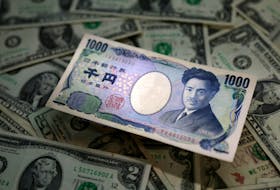By Leika Kihara and Takahiko Wada
TOKYO (Reuters) - The Bank of Japan accommodated radical investor demands when overhauling its stock-buying program, such as lending ETFs more frequently than proposed, sources said, in a rare move that underscores the strain its stimulus has created in markets.
The bank will likely start lending exchange-traded funds (ETF) from April, the people also said, furthering efforts with the Tokyo Stock Exchange to nurture an ETF market that is just one-tenth the size of that in the United States.
The development comes after the BOJ last month finalised its plan to lend ETFs to lift trading volume and address criticism caused by its stock-buying program - intended to pump money into the economy to spur growth and inflation, but which market participants said has drained liquidity and skewed pricing.
The bank initially planned to set the borrowing cost for its ETFs via monthly auctions, but following consultations with market participants, agreed to more onerous daily auctions to give investors access whenever they wanted, said the people, who are familiar with BOJ thinking.
"It's unusual for the BOJ to accept such a stark change. But it was probably important to make the scheme as user-friendly as possible," said one of the people, who were not authorized to speak publicly on the matter and so declined to be identified.
The BOJ said it will begin accepting applications to participate in the scheme from Friday.
PROBLEM SOLVING
Borrowing ETFs in Japan is not as easy as in the United States, with financial institutions usually meeting buy orders by bundling stocks to create ETFs at short notice. That makes the practice costly, discouraging trading and keeping the market illiquid.
The BOJ wants to change this by offering institutions a more affordable way to create ETFs, the people said.
"The problem with Japan's ETF market is that there were very few institutions willing to lend out ETFs. The BOJ's scheme will help solve this problem," said Masahiro Omaki, equities department manager at Tokyo stock exchange JPX.
Market participants generally welcomed the scheme, but some said it came more of necessity to address criticism that BOJ asset-buying was crowding out private investors.
Latest data showed the bank has gobbled up 70% of Japan's ETF market. It continues to buy at an annual pace of roughly 6 trillion yen ($54.69 billion).
"The scheme takes into account a lot of requests made by brokerages and asset managers," one of the people said.
The BOJ's response to market requests is contrary to when it adopted negative interest rates in 2016, which caught financial institutions off guard.
"The scheme is designed in a way that's quite considerate to investors' demands," said Koei Imai, head of Nikko Asset Management's ETF business division.
"Given lingering criticism that its ETF-buying program is distorting stock pricing and draining market liquidity, I suspect the BOJ decided to make better use of its ETF holdings to ensure it can keep buying the instruments flexibly and sustainably," he said.
($1 = 109.7000 yen)
(Reporting by Leika Kihara and Takahiko Wada; Editing by Christopher Cushing)









